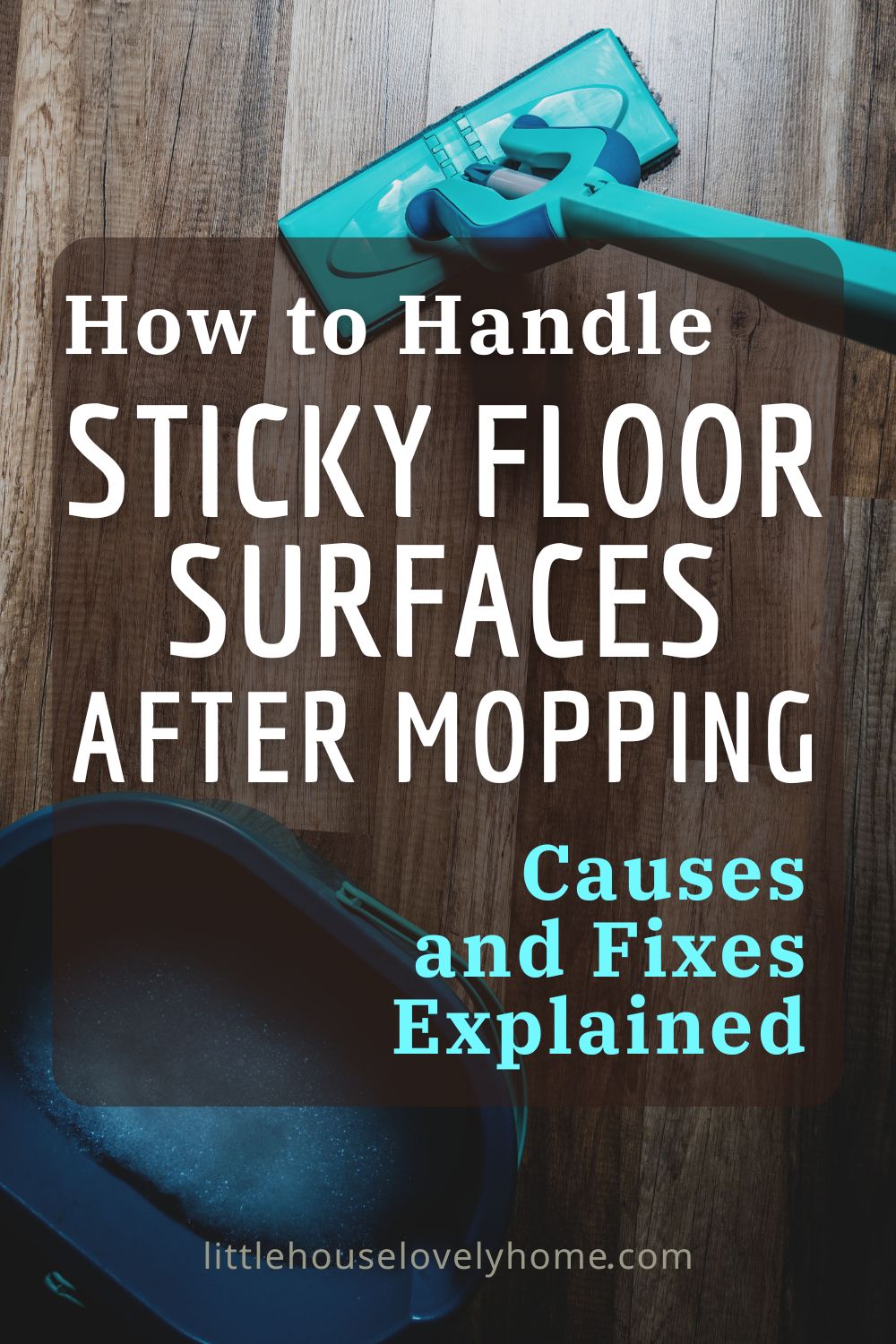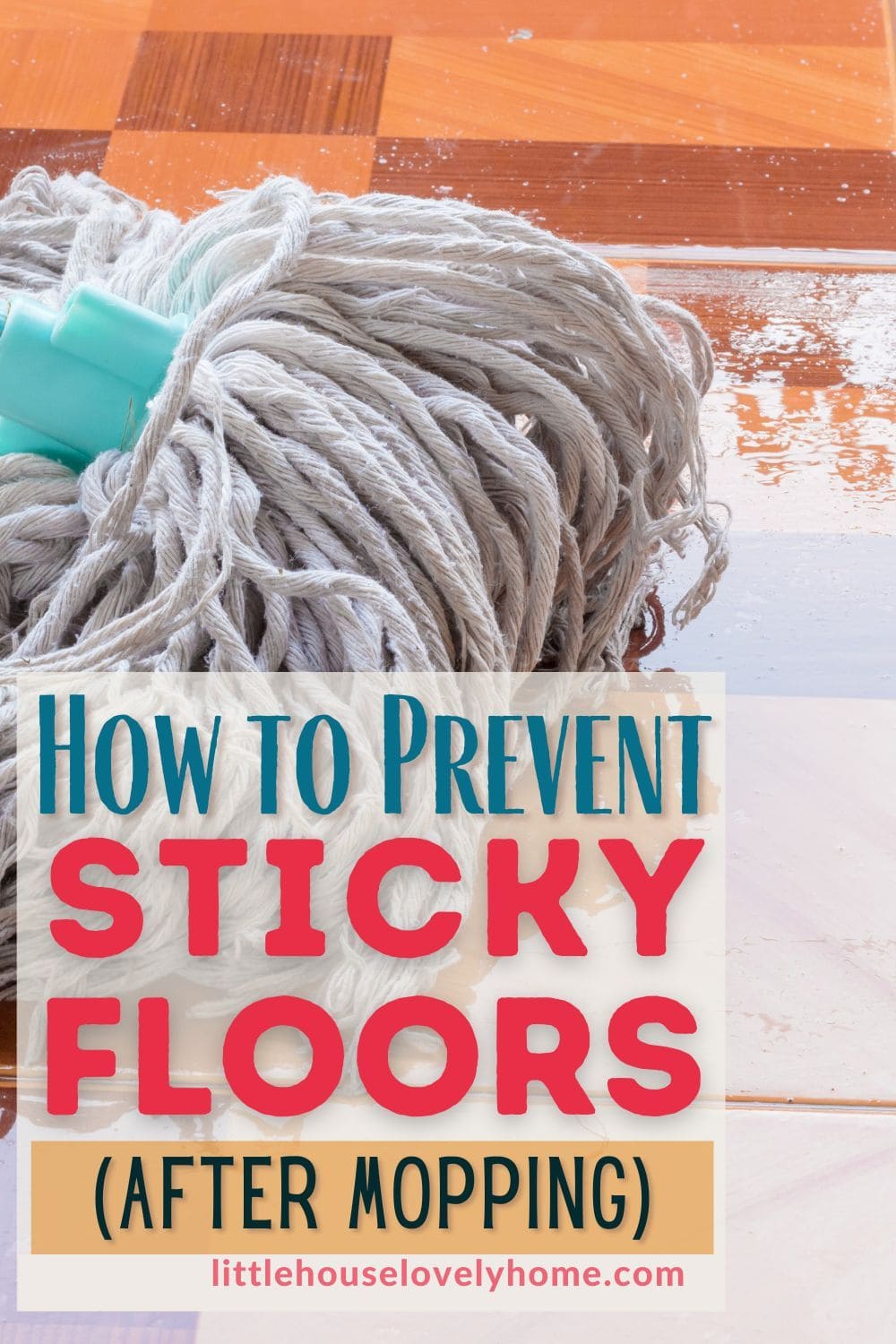Have you ever mopped your floors clean, only to find them sticky afterward?
It can be frustrating to put in the effort to clean your floors, only to have them feel dirty again.
Sticky floors after mopping can be caused by a variety of factors, and it’s important to understand what’s causing the problem in order to fix it.
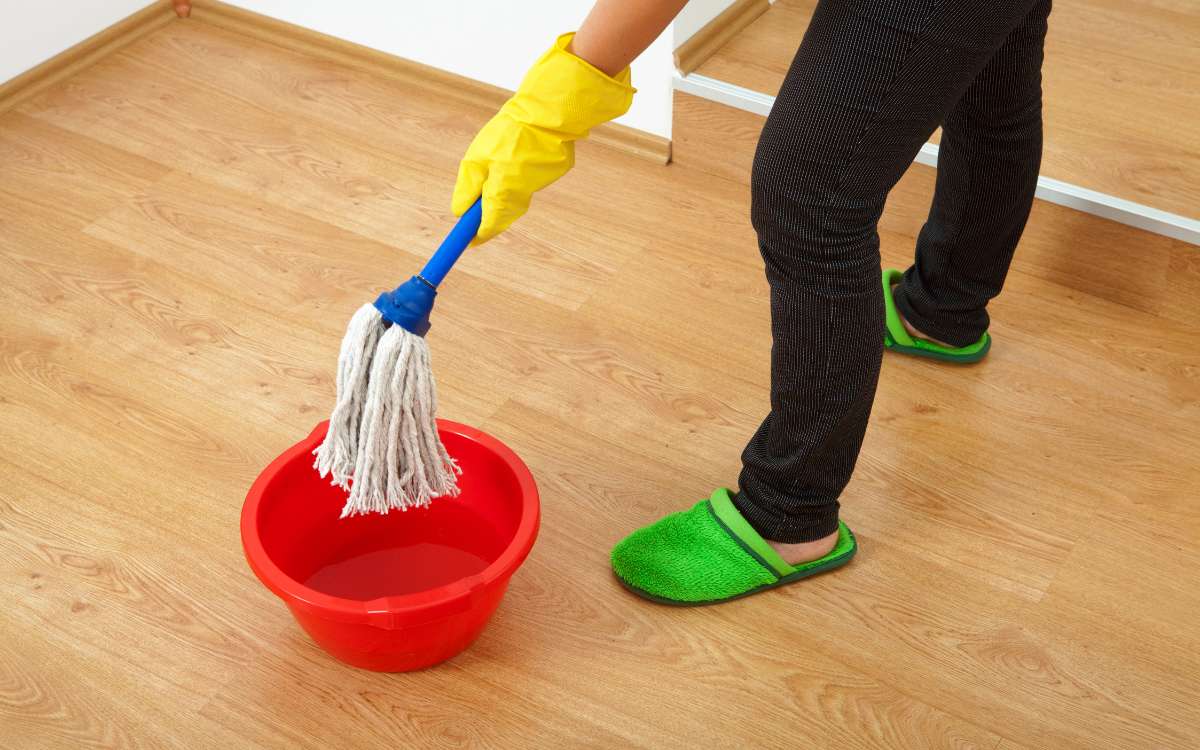
Common Causes
Using Too Much Floor Cleaner
One of the most common causes of sticky floors after mopping is using too much cleaning solution.
When you use too much cleaning solution, it can leave a residue on the floor that makes it sticky.
Remember to follow the manufacturer’s instructions when it comes to the amount of cleaning solution to use.
A general rule of thumb is to use a 1:10 ratio of cleaning solution to water.
Not Rinsing the Mop
If you don’t rinse your mop properly while cleaning, it can leave behind a soapy residue on the floor.
This residue can make the floor sticky. Always rinse your mop thoroughly after each pass on the floor.
This will help to remove any excess cleaning solution and prevent the buildup of any residue left behind on the floor.
Dirty Mop or Bucket
Using a dirty mop or bucket can also cause sticky floors after mopping.
If your mop or bucket is dirty, it can leave behind dirt and grime on the floor that can make it sticky.
Always make sure your mop and bucket are clean before you start mopping.
You should also change the water in the bucket frequently to prevent the buildup of dirt and grime.
Low-Quality Cleaning Products
Using low-quality cleaning products or the wrong cleaning solution can also cause sticky floors after mopping.
These products can leave behind a residue on the floor that makes it sticky.
Always use high-quality cleaning products that are designed for your type of flooring.
This will help to remove sticky residue and ensure that your floors are clean and free from residue.
Floor Type Matters
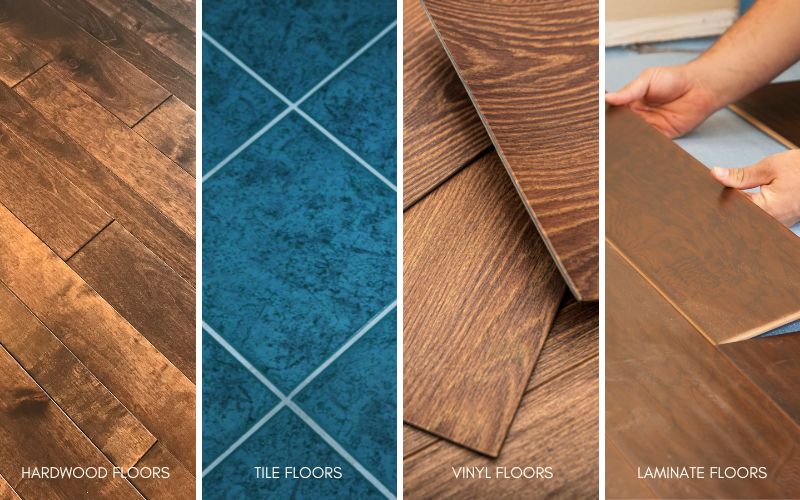
When it comes to cleaning floors, the type of flooring you have can play a big role in how sticky it gets after mopping.
Here are some common flooring types and how they can be affected:
Hardwood Floors
Hardwood floors are a popular choice for many homeowners due to their durability and natural beauty.
However, they can be susceptible to damage if not cleaned properly.
When mopping hardwood floors, it’s important to use a cleaner that’s specifically designed for wood floors.
Using too much water or a cleaner that’s too harsh can cause the wood to warp or become discolored.
Additionally, be sure to dry the floors thoroughly after mopping to prevent any excess moisture from seeping into the wood.
Tile Floors
Tile floors are a great option for high-traffic floor areas such as kitchens and bathrooms. However, they can also be prone to becoming sticky after mopping.
One common culprit is using the wrong cleaning agent.
Be sure to use a cleaner that’s specifically designed for tile floors, as using a cleaner that’s too harsh can cause damage to the grout and tiles.
Additionally, be sure to rinse the floors thoroughly after mopping to remove any excess cleaner.
Vinyl Floors
Vinyl floors are a popular choice for many homeowners due to their affordability and ease of maintenance.
However, they can also become sticky after mopping if not cleaned properly.
One common mistake is using too much water or cleaner, which can cause the adhesive holding the vinyl in place to break down.
To prevent this, be sure to use a floor cleaner, that’s specifically designed for vinyl floors and to follow the manufacturer’s instructions for use.
Laminate Floors
If your laminate floors feel sticky after mopping, there could be several reasons why. One common cause is using too much water or the wrong cleaning solution.
Laminate flooring is designed to be moisture-resistant, but excessive water can cause it to swell and warp, leading to a sticky feeling.
Another common culprit is using a cleaning solution that leaves behind a residue on the surface of the laminate floors. Some cleaners contain ingredients that can build up over time, leaving a sticky residue on the floors.
To prevent laminate floors from feeling sticky after mopping, it’s important to use a cleaning solution specifically designed for laminate flooring.
These cleaners are formulated to clean without leaving behind a residue.
It’s also important to use a minimal amount of water and to dry the floors thoroughly after mopping to avoid excess moisture.
Prevention Tips
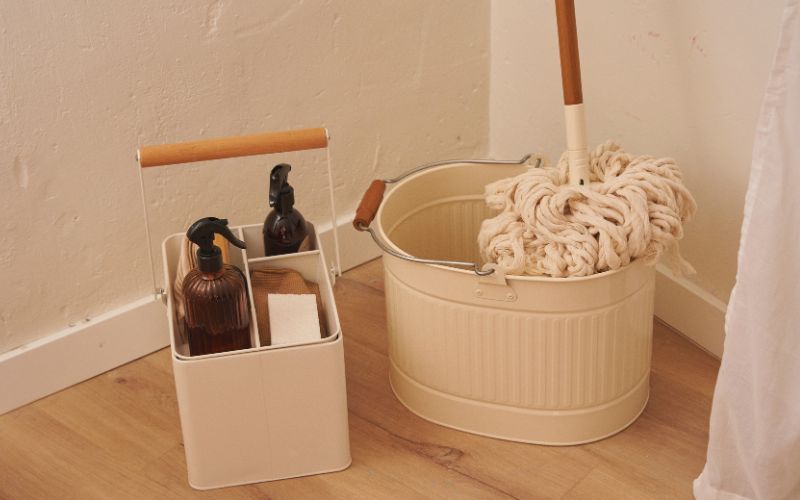
Use Less Cleaning Solution
One of the most common reasons for sticky floors after mopping is using too much cleaning solution.
Using too much cleaning solution can leave a residue on the floor that attracts dirt and dust, making the floor sticky.
To prevent this, use less cleaning solution than recommended on the label. A small amount of cleaning solution is usually enough to clean the floor properly and effectively.
Rinse the Mop Thoroughly
Another reason for sticky floors is not rinsing the mop thoroughly after use.
When the mop is not rinsed properly, the cleaning solution and dirt can build up on the mop head, causing streaks and a sticky residue on the floor.
To prevent this, rinse the mop thoroughly with plain water after each use. Use clean water to rinse the mop head until the water runs clear.
Clean the Mop and Bucket After Use
Dirty mops and buckets can also contribute to sticky floors.
When the mop and bucket are not cleaned properly after use, dirt and cleaning solution can build up, leaving a residue on the floor.
To prevent this, clean the mop and bucket after use. Rinse the mop head and mop bucket with clean water and let them air dry before storing them.
Invest in High-Quality Cleaning Products
Using low-quality cleaning products can also cause sticky floors.
Cheap cleaning products may not effectively remove dirt and grime from the floor, leaving a residue behind.
Investing in high-quality cleaning products can help prevent sticky floors.
Look for cleaning solutions and products specifically designed for your type of flooring and follow the manufacturer’s recommendations for use.
Floor Sticky After Mopping – FAQ
What are the most common causes of sticky floors after mopping?
One common cause is using dirty water to mop the floors. When dirty water is used, it can leave behind residue on the floors, leading to a sticky feeling.
Another culprit is steam mops. While they are a convenient and effective way to clean floors, they can leave behind excess moisture that can cause the floors to become sticky.
Using the wrong cleaning solution can also lead to sticky floors. Some cleaning solutions can leave behind a residue that can cause the floors to feel sticky.
It’s essential to use a cleaning solution that is appropriate for the type of flooring you have to avoid this problem.
To prevent sticky floors, it’s essential to use clean water and change it frequently while mopping.
If you’re using a steam mop, make sure to follow the manufacturer’s instructions to avoid using too much moisture.
It’s also crucial to use the correct solution and avoid using too much of it. Always use the recommended amount to avoid leaving behind residue.
How often should I change the water while mopping to avoid sticky floors?
The exact frequency will depend on several factors, such as the size of the area being cleaned, the type of flooring, and how dirty the floors are.
As a general rule of thumb, it’s recommended to change the water every time you move to a new section of the floor.
For larger areas, you may need to change the water more frequently to ensure that it remains clean and effective at removing dirt and grime.
If the water becomes visibly dirty or murky, it’s time to change it regardless of how much of the floor you’ve cleaned.
Using dirty water to mop can leave behind a residue that can cause the floors to feel sticky.
